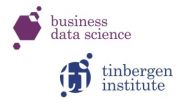7 July 2023
on course website
Networks in Micro- and Macro-Economics
Networks play an increasingly dominant role in many social, business, and economic environments. Moreover, network data becomes increasingly important and available due to the rise of online digital data sources. This course offers a concise introduction into the most recent economic models and econometric methods developed for processing, visualizing and learning from network data. We provide a comprehensive approach for analyzing networks, both, from microeconomic as well as macroeconomic perspectives. This will provide course participants with a generic network analysis toolbox that can then be applied to particular environments and applications, depending on idiosyncratic needs and interests. To further aid the understanding of network concepts and methods the course will combine lectures with hands-on empirical and programming exercises.
Course leader
Andrei Levchenko is the John W. Sweetland Professor of International Economics at the University of Michigan and Michael D. König is associate professor at the Department of Spatial Economics at Vrije Universiteit Amsterdam.
Target group
Level
The Summer School welcomes master students, advanced bachelor, PhD students, post-docs as well as practitioners who are interested in learning the most recent economic models and econometric methods developed for processing, visualizing and learning from network data. We provide a comprehensive approach for analyzing networks, both, from microeconomic as well as macroeconomic perspectives. This will provide course participants with a generic network analysis toolbox that can then be applied to particular environments and applications, depending on idiosyncratic needs and interests.
Admission requirements
The course will be accessible to advanced undergraduate and graduate students as well as practitioners from related fields.
Course aim
Learning Objectives
Upon successful completion of the course, participants will:
become acquainted with different methodologies for analyzing networks while learning how to see these different methodologies complementing each other.
learn to model network problem situations mathematically, and adapt the methods learned to new situations at hand.
be able to recognize, understand, and analyze societal and business problems in which networks are central.
learn how networks affect demand and supply in markets, how this leads to market failures, and how government policies can address these.
Credits info
3 EC
Participants who joined at least 80% of all sessions and hand in the solutions to the exercises by the end of the week receive a certificate of participation stating that the summer school is equivalent to a workload of 3 ECTS. Note that it is the student’s own responsibility to get these credits registered at their own university.
Fee info
EUR 800: Early Bird for PhD and Master students (available until April 15) € 800
PhD and Master Students € 1.000
The course fee covers tuition, course materials, daily lunches and coffee/tea during short breaks, social events including a dinner and farewell drinks. The course fee does not include accommodation.
EUR 2000: Academics (incl. postdocs) and Professionals € 2.000
The course fee covers tuition, course materials, daily lunches and coffee/tea during short breaks, social events including a dinner and farewell drinks. The course fee does not include accommodation.
on course website
Organizing institution
Tinbergen Institute & Business Data Science Summer School
all courses school website
